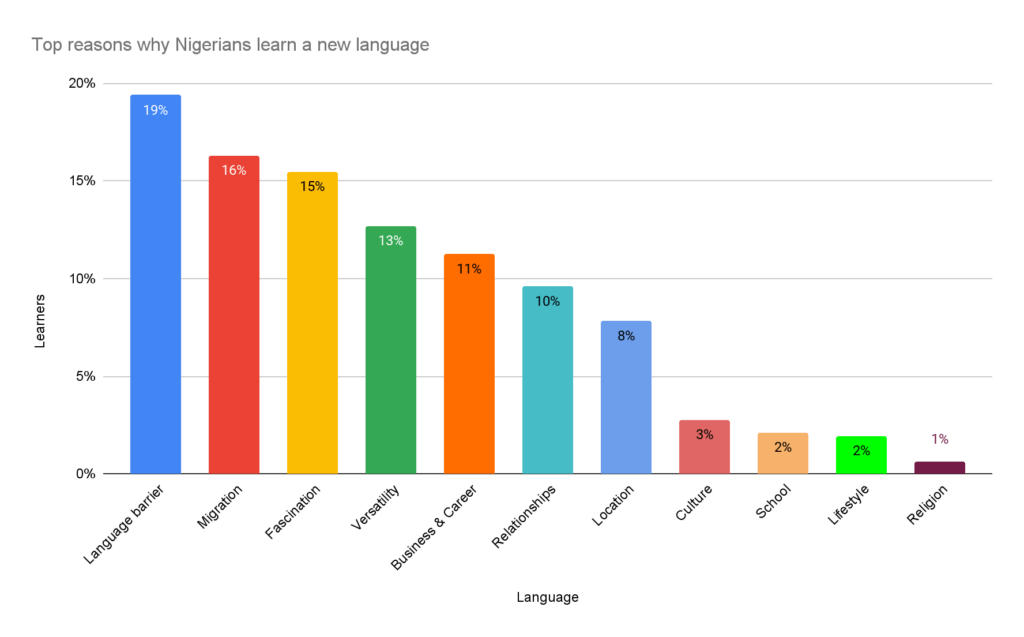Language can be many things—a means of communication, identity, culture, history, and so on. But for most people, language only serves as a tool for daily transactions and activities. That’s why the average person doesn’t consider learning a second language until they have to, which is okay.
For most Nigerians (Africans in general), where colonialism introduced a foreign language into the national system, speaking at least two languages often comes naturally. Then, there’s also the factor of multiple cultures within the country, meaning citizens regularly interact with people of other languages.
Hence, for a Nigerian, it’s even more important to speak at least two languages. But aside from the need to communicate when interacting with people of other languages, are there any other benefits to learning a second language? We’ll discuss all that in this piece.
Why do people learn a second language?
First, there are several reasons why people learn a new language. From these reasons, we can deduce why learning a second language is essential to learners. On a different front, several studies are ongoing to pinpoint the benefits of learning a second language on the brain.
As part of our indigenous language study, we asked Nigerians to state the reasons why they would consider learning a new language, and we got this:

This chart shows that the need to understand others remains the biggest drive for learning or speaking a language.
Importance of learning a second language
Using the information from our survey responses and insight from academic research, we have picked the seven most important reasons you should consider learning a new language.
Let’s get into the meat of it.
1. To connect better with people
The top reason why Nigerians seek to learn a new language is to relieve any language barrier between themselves and the people they constantly interact with.
As humans, we all seek to make meaningful connections. These connections would be impossible with hampered communication.
It’s also no surprise that many learners opt to learn a new language just to improve the quality of their relationships. This could be a relationship with family or a romantic partner from another culture. Or to improve rapport with a colleague or neighbour.
It’s clear that learning a second language can prove to be a massive advantage in relationships and human interactions.
2. Useful for travel and migration
Closely following the need to eliminate language barriers is the need to communicate clearly while in a foreign location. This is especially true in Nigeria, where most natives find themselves in a region where a different indigenous language is spoken during their compulsory national youth service year. In situations like that, learning the basics of a new language becomes vital for survival.
Also, for people who travel out of their countries into regions with a different language from their lingua franca, learning a second language becomes absolutely important.
3. Helps you become more versatile
There are many advantages to being a polyglot. One of them is that you are more vast in your use of words. Switching between languages allows you to pay more attention to words that best communicate your thoughts when you’re speaking.
Exposure to the ideologies associated with different languages and cultures also helps expand one’s worldview, making one more versatile in conversation and thinking. This also explains why many people believe that learning a second language can boost one’s creativity.
4. Better cultural appreciation
It’s hard to appreciate what you can’t relate to properly. This is why most people never relate well to other people’s cultures and practices. However, learning a second language can quickly change the narrative.
Learning their indigenous language as a second language helps Nigerians who grew up speaking a foreign language better appreciate their culture and history. The same holds true for learning a foreign language as a second or third language.
5. Access peculiar opportunities
Multilingualism provides access to certain reserved career opportunities where people who can speak a specific combination of languages are required.
Apart from that, business deals happen every day between natives of different tribes. Business happens more freely when the transactors can understand one another clearly. In that case, learning a second language can be of significant importance.
6. Improves your first language
The only way to learn a new language is to successfully attribute words from a second language to their meaning in your first language (or language of reference). Learning a second language forces you to constantly update your first language vocabulary to achieve accurate interpretation.
7. Helps stimulate the brain
According to this research, learning a second language can improve memory and delay the onset of old-age memory loss. Learning a second language stretches the mind by constantly utilising your retention and memorisation skills.
FAQs
- Does learning a new language improve memory?
Learning a new language helps improve memory as committing words and meaning to the mind requires retention and long-term memory skills.
- Are there any benefits of learning a second language on the brain?
According to Neuroscience studies, learning a second language is essential for maintaining a sharper mind into old age. However, more research is still needed to prove how much bilingualism helps brain power.
- What are the challenges of learning a second language?
Some of the challenges of learning a second language include language difficulty, inadequate learning resources, and lack of time and commitment. However, the importance of learning a second language far outweighs the challenges.
PS: To solve the challenge of lack of time and commitment, you need to plan your language learning around the estimated learning time for your chosen language. Read our article on how long it takes to learn a new language to get started.
What next?
Now that you’ve realised the importance of learning a second language, it’s time to take more control of your language-learning journey.
At Prepmewell Language Institute, we offer immersive language classes where learners learn and practise their new language on the go. We offer personal and group classes in French, Yoruba, and Igbo languages.
Ready to get started with learning? Click here to sign up today.



